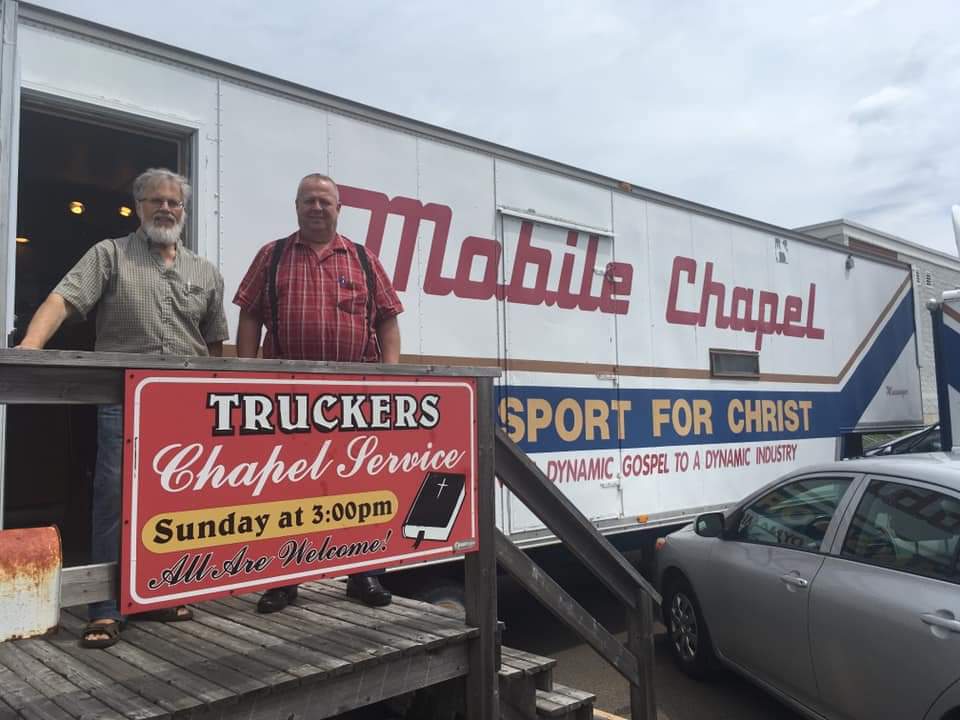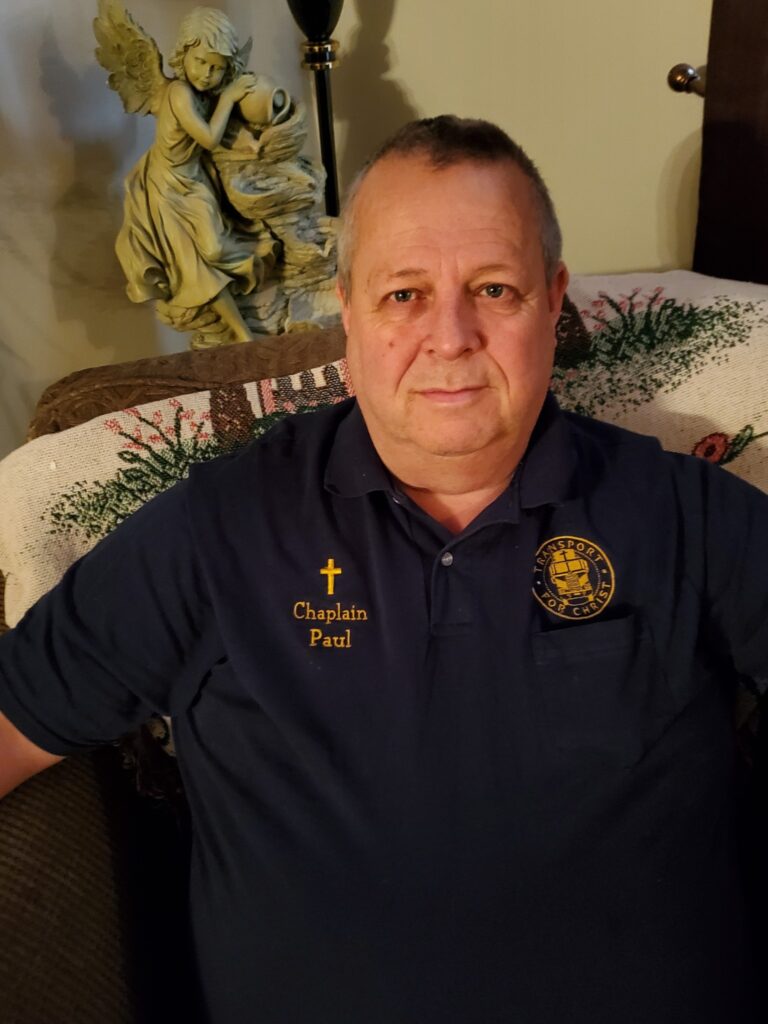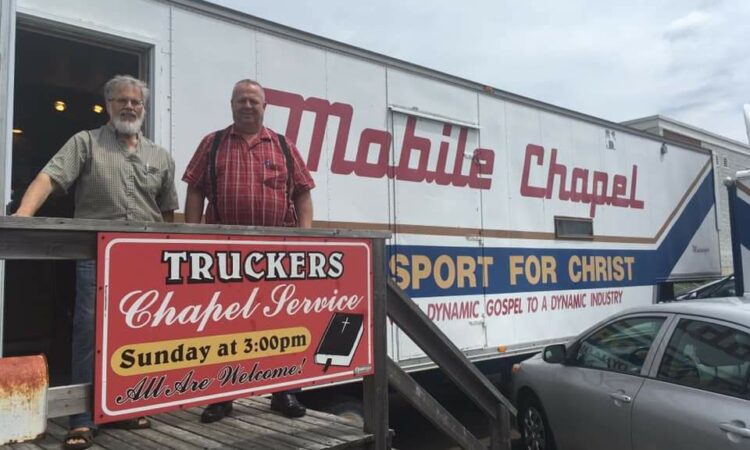When Paul Leger opened the door of his chapel on wheels to greet another truck driver, he thought it would be a visitor looking for spiritual guidance. This time the man was only looking for a part to repair a broken truck refrigerator.
Leger’s three-decade-long experience in trucking came in handy while figuring out where to call to find the needed part. They talked a while, and soon the driver was back on the road.
But two weeks later, the same man called the chaplain for another reason. He wanted to pray for a fellow truck driver who had returned home only to find that his wife, unborn child, and three-year-old daughter had been killed by a drunk driver.

“You could tell he was really hurting. He was really struggling,” Leger says. “He shared with me what had happened so that I could be praying for him and particularly for his best friend.”
They’re just two examples of the interactions Leger has with people, mostly truck drivers, who come to his in-truck chapel parked at the Irving Big Stop in Salisbury, N.B., 15 miles west of Moncton. Each personal connection leads to another.
It has now been more than 22 years since Leger became the lead chaplain for the mobile parish. And being a former truck driver himself, he believes he can relate to truck drivers and their struggles.
“Even though we have a chapel service every week, I wouldn’t call that the primary function of the chapel. It’s mostly one-on-ones. If a driver comes in, or I meet a driver in the parking lot, or in the truck stop, or over at Tim Hortons next door, or whatever it is, it’s really a one-on-one conversation or kind of a connection rather than a formal church service,” he says.
“We do a church service, but it’s really a small part of what we do, ever since I’ve been there.”

What haunts truck drivers
The troubles that bring drivers to the chapel have not changed much throughout the years, although the details may look a little different, Leger says. But things that haunt drivers the most come with the job.
Witnessing the acts of human trafficking at truck stops has become one of the most traumatizing experiences for them, he says. Especially now that the problem is worsening across the industry.
“That happens everywhere, including this little truck stop located in the middle of nowhere,” he says. “I’ve witnessed it myself…It’s a very tricky and very difficult thing to deal with.”
On top of that, due to the negative stereotypes that surround truck drivers, many find themselves feeling inferior and underappreciated. That was already a longstanding issue when he first sat behind the wheel of a truck more than 50 years ago. And it has not gone away since then.
In the same way, the time spent away from home and the loneliness that comes with it has always been an issue for longhaul drivers. Despite the technological advances that keep people connected, the pressure of not being there for loved ones has not eased over the last two decades, Leger says.
All these things can sometimes drive some truckers to give in to temptations such as drug abuse and more. And it might take a while for someone to realize their life is on a downward spiral.
Spiritual challenges
It happened to Leger before he began his own spiritual journey.
He was raised in a spiritual family and always had respect for God. However, it was not until his 30s that he uncovered the significance of faith – for him and his family.
“I was married and had two children at the time and loved my family dearly. I worked very hard all the time, and I was rarely home, which was an issue for a lot of drivers and for me as well. When I was home, I was usually thinking about being on the road again. So even though I was physically there, I might not have been completely there. So, I didn’t really realize the extent of the spiral. Until we started going back to church.”
Leger used to drop his family off at the church, but he would only join on special occasions.
That began to change on Christmas Eve in 1989, when the family attended service in a small church they happened upon. But it felt like home. And he began frequenting the church every week.
“I would hear something on a Sunday. And then early Monday morning, in my truck, I would talk to God, and I would just ask the questions and say, ‘OK, well, you answered this, but what about that?’ And invariably, the following Sunday, the pastor would preach a sermon that would answer that Monday question … and it kept happening week after week.”
Eventually, Leger says he decided to follow God. That was on a Tuesday morning, May 13, 1990. It’s a specific date, but he clearly remembers coming to the decision while sitting in his cab, on a side of Highway 11 in Saint Margaret, N.B.
Transport for Christ
It led to time as a pastor in a small local church, and in 2000 he became the fleet chaplain at Transport for Christ.
He recalls being interested in the job, but he doubted if he would be able to raise enough funds to keep the chapel’s trailer door open.
“I’m not very comfortable speaking about money and trying to solicit funds, so I kind of backed away from it, and stayed away for about a year. But I’ve had the constant sense in my heart that I needed to be there. I think that was really the calling.”
For the first three years, Leger collected no salary at the chapel and kept trucking to pay the bills. But it has been more than 20 years since then, and the chapel is still there, operating mostly on donations.
He hopes they’ll eventually get enough support to return to the pre-Covid tradition of making personal care packages for truck drivers and giving them out around Christmas.
But at the end of the day, it is all about inspiring truckers who are away from home – whether through the Sunday service, one-on-one in the parking lot of a truck stop, or a simple phone call.
“We try to instill the value and appreciation that we have. As a former truck driver, I understand it firsthand. But even volunteers who work for me — one is a former driver, one is not — but both have this compassion and empathy. They are so passionate to help drivers and appreciate them.”


